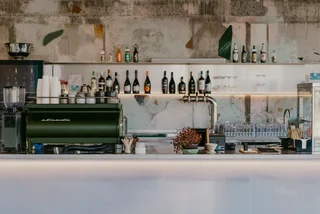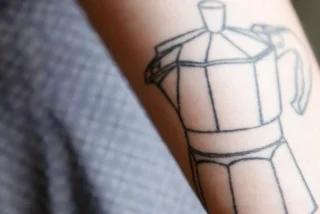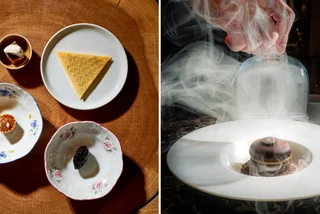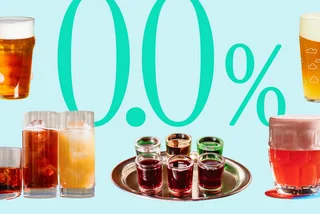In honor of International Coffee Day on October 1, a couple of new polls are stirring up some interesting stats on coffee habits in the Czech Republic which has come a long way since the “Turecká káva” or "preso s mlékem" filled cafe cups.
It's clear that Czechs love coffee. Only 12 percent of Czechs don’t drink it, according to a survey conducted by Ipsos for coffee company Jacobs Douwe Egberts, which found that more than half of Czech coffee drinkers have a cup in the morning shortly after waking up and more than half drink at least two or three cups a day.
Coffee consumption has been growing since 2015, increasing by an impressive five and a half percent last year. The Czech Statistical Office puts the annual coffee consumption in the Czech Republic averages at 2.2 kilograms per person.
Prague is particularly coffee-mad. The local coffee scene starting heating up roughly a decade ago with an influx of "hypertechnical" coffee houses opening in the Czech capital. The debut of the first Prague Coffee Festival in 2012 (which returns this year on October 18) was associated with a widespread initiative to educate Czechs about quality coffee.
Matthew Deyn is a coffee professional and barista based in Prague. He describes the current coffee scene as "understated."
"There certainly is a wider availability of great coffee and higher awareness for it, however, I feel that Czech coffee professionals prefer the understated approach when it comes to their craft," he said.
"Perhaps the main development I've noticed on the scene here in Prague is that more thought and attention to detail is being put into the design of shop spaces and more coffee shop owners are starting to roast their own beans."
Deyn, who can be found behind the espresso maker at Kampa Cafe in Anděl from time to time, says Czech coffee consumption is "fairly consistent whether it's coffee beans for home, having coffee before work or at social meetings."
One difference he points out between Prague and elsewhere is the lack of takeaway coffee culture. But he says that coffee-lover are in the right place: "The quality of the coffee on offer here certainly rivals more prominent cities."
Deyn's comments with regards to Czechs and the importance of coffee in the workplace are spot on. Research conducted by Seznam Zpravy found that having good-quality coffee in the office is becoming an increasingly important contributor to workplace morale.
Although less than 30 percent of Czech coffee lovers have their coffee at work, employers are increasingly aware that providing the required facilities is an easy way to make employees happier. A coffee stop is also a good place for people to catch up and discuss their work, boosting productivity.

“The location of the kitchen and the coffee machine plays an important role in the workplace, especially when the kitchen is designed as a co-working zone,” Lucie Loudová, director of design and construction company Tétris told Seznam Zpravy.
“Many tasks can be solved with an informal meeting over a cup of coffee. One of our clients moved all their coffee machines preparing lattes to another floor of the building because they wanted people to meet each other there,” she added.
The Jacobs Douwe Egberts poll, conducted in September 2021, found that Czech preferences are increasingly leaning toward higher-quality types of coffee. While Czechs have traditionally preferred the simplicity of old-fashioned Turecká káva or instant coffee, an increasing number now drink coffee from beans prepared in an automatic coffee machine, or coffee delivered in capsules.
Czech coffee has certainly come a long way from the classic “Turecká káva,” which has relatively little in common with its Turkish namesake. This murky substance is made by pouring boiling water over ground coffee. The drink is then consumed with the dregs still in the bottom of the cup, the drinker using their teeth as a filter.
But it may not have come quite far enough says the Turkish ambassador to the Czech Republic Egemen Bağış who has long been justifiably outraged by such a misrepresentation of traditional Turkish coffee.
So much so that the Turkish Embassy in Prague this month held an event of “coffee diplomacy” in which various ambassadors and Czech government figures were invited to discover true Turkish coffee, its history, and its arrival in Europe.
As part of the embassy’s Turkish Culture Festival, coffee was offered for free at locations throughout Prague.
Today's stop of our #TurkishCoffee Culture themed festival was Kavafaktura kiosk in NárodnÃ, one of the busiest streets in the center of Prague. 🇹🇷☕ï¸(1/2) pic.twitter.com/QIerpWFyX2
— TurkishEmbassyPrague (@TurkishEmbassyP) September 17, 2021
“Those who drink Turkish coffee are amazed,” said Turkish ambassador to the Czech Republic Egemen Bağış. “They admit that the coffee offered to them as ‘Turkish coffee’ is simply ground coffee thrown into hot water: it does not mix well with water and they cannot taste it. For this reason, we want to promote our coffee, our culture and our country.”
Turkish, Czech, or otherwise, Europeans as a continent drink a third of the world’s coffee, with the highest annual consumption in Scandinavia, where historical reasons led coffee to develop as a substitute for beer at social gatherings.
In the Czech Republic coffee was first sold in pharmacies in this country, so people considered it a health aide.
With that in mind, on International Coffee Day, it’s time to take a break, gather together, and raise a mug to coffee in all its wonderful varieties. Na zdraví!












 Reading time: 4 minutes
Reading time: 4 minutes 































